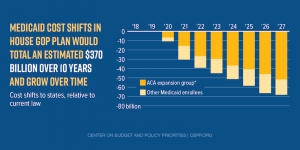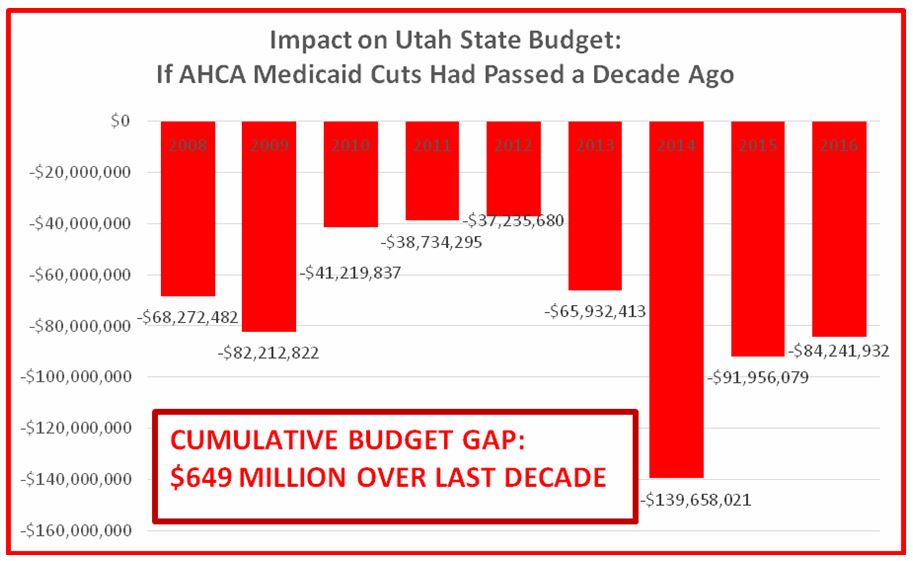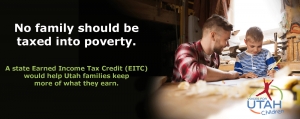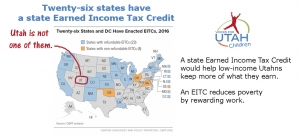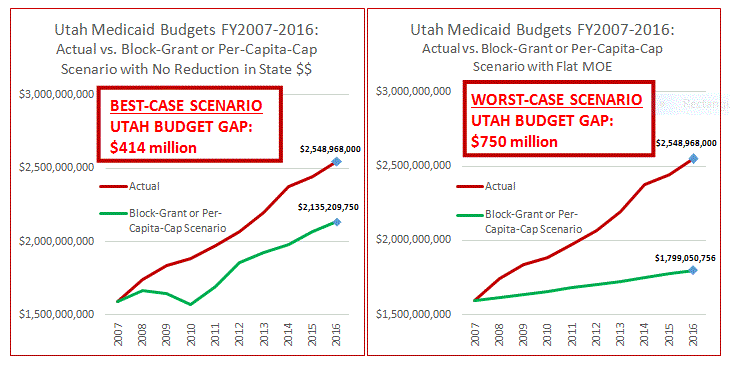Poverty
Under the ACA Repeal Bill, Utah Medicaid Stands to Lose Millions over a 10-Year Period
Congress’ health plan bill, the American Health Care Act, proposes a major restructuring to the Medicaid program. The proposal would cap the federal funding states receive on a per-Medicaid beneficiary basis, starting in 2020. Using retrospective data, Voices for Utah Children investigated the impact of these changes on Utah’s state budget, had they been enacted a decade earlier.
The chart below illustrates the Utah budget impact of the Medicaid per capita cap allotment, if it had gone into effect a decade ago. The scenario is based on the American Health Care Act and state Medicaid annual reports. Given inflation and rising health care costs, Utah could expect the budget gap for the coming years to significantly exceed what it would have been in the past.
The proposed Medicaid caps would be based on states’ per-beneficiary spending, set in fiscal year 2016, and would rise annually to match growth in the medical care component of the Consumer Price Index (M-CPI). States are already locked into their capped amount. However, according to Congressional Budget Office forecasts, Medicaid costs per beneficiary are expected to rise 0.2 percentage points faster each year than the capped amount.
Consequently, states would get less federal funding than under current law and could expect to see cuts growing each year.
States would be expected to make up any excess costs or cut benefits to enrollees. Any unanticipated health care cost growth, such as a Zika outbreak or a new opioid treatment drug, would not be accounted for in the federal per capita cap amount.
As retrospective data illustrate, Utah consistently would have less available funding for health care costs. Today over 200,000 children rely on Medicaid coverage, including children with special health care needs. The majority of Medicaid enrollees (63%) are children. The Congressional proposal would create situations where state lawmakers choose which health services vulnerable children are eligible to receive, and which services or benefits they will not be eligible to receive. These are decisions best left up to health care providers, not politicians.
The American Health Care Act puts children’s health care and coverage at risk. Changes to Medicaid’s financing structure through a per capita cap would create large shortfalls in Utah’s state funding. These shortfalls would inevitably lead to limits placed on the program, such as a reduction in benefits, cuts to provider payments or fewer children covered. This unprecedented restructuring of the Medicaid program puts Utah children’s health care and coverage at risk.
 March 30, 2017 is Love UT Give UT!
March 30, 2017 is Love UT Give UT!
It’s a day for Utahns to give to the nonprofits that make Utah special. Every donation to Voices for Utah Children through Love UT Give UT gives Voices a chance to win matching grants and prizes—and gives you a chance to win a car!
And you don't have to wait! Donate now at http://bit.ly/loveUTchildren.
For 30 years now, Voices for Utah Children has called on our state, federal and local leaders to put children’s needs first. But the work is not done. The children of 30 years ago now have children of their own. Too many of these children are growing up in poverty, without access to healthcare or quality educational opportunities.
How can you be involved?
Make a tax-deductible donation to Voices for Utah Children—or join our Network with a monthly donation of $20 or more. Network membership includes complimentary admission to Network events with food, socializing, and opportunity to meet child advocacy experts. And don't forget to join our listserv to stay informed!
We look forward to the future of Voices for Utah Children and we hope you will be a part of our next 30 years.
Special thanks to American Express for sponsoring our 30th Anniversary Year. 
The 2017 legislative session was remarkable for focusing more on tax policy than any session since 2007. This came in response to the November 29, 2016 announcement by Our Schools Now of their intention to pursue a campaign to place on the 2018 ballot an initiative to generate $750 million for public education through an increase in Utah’s income tax rate from 5% to 5.875%. In response, the Legislature engaged in a detailed and wide-ranging examination of several tax restructuring options. In that process several important lessons were learned:
LESSON #1: RESTORING REVENUES:
The Utah Legislature is unlikely to pass a tax reform package that is more than marginally or perhaps gradually revenue positive. While it appeared that the Senate was willing to support restoring some state revenues to address the current underinvestment in children, the House of Representatives was particularly averse to generating new revenues for the public investments that our state critically needs, despite strong evidence that Utah’s tax burden remains at a multi-decade low. This strengthens the argument for taking the question directly to voters through the initiative process.
LESSON #2: SALES TAX ON FOOD:
Restoring the sales tax on food is not only the most regressive of the options that were considered, it also fails to substantially reduce revenue volatility during recessions. Moreover, we also learned that restoring the sales tax on food while offsetting that with a lower overall sales tax rate involves a $40 million shift of sales tax burden from out-of-state to in-state taxpayers, since 97% of the food sales tax increase would have been paid by Utahns, while out-of-staters would have received 23% of the overall sales tax rate reduction.
LESSON #3: PROTECTING THE POOREST:
The legislative leadership was genuinely concerned about the impact that raising the food sales tax would have on the poor and made a sincere effort to find ways to achieve their goal of broadening the base without burdening low-income Utahns. Since we never saw a final proposal, we can’t evaluate it properly, but it was clear from the evolution of their ideas that House and Senate leaders were sensitive to the concerns of advocates for the poor such as Voices for Utah Children and our partners. They incorporated into their proposals some ideas from the research that we released at our coalition press conference on February 23 at the Capitol.
LESSON #4: OUR SCHOOLS NOW:
The Our Schools Now proposal to raise the income tax rate from 5% to 5.875% is the fairest to low-income Utahns of any of the leading tax reform proposals. Only 2% of its new revenues come from the lowest quintile of tax filers, those earning under $25,000, who could easily be shielded with an offsetting EITC. And 58% of the $750 million of new revenues comes from the highest quintile, those earning over $111,000. Indeed, that 58% share is approximately equal to the share of all Utah income earned by the top quintile of Utahns. But what about the cost to middle-income Utahns? Under the proposal, the median household pays about $350 more annually. If that family has two kids in the public schools, then their $350 upfront payment will reap a gain of over $2,000 in new investment in their own children – good luck trying to get a return like that in the stock market!
LESSON #5: EITC:
The Earned Income Tax Credit gained in popularity this year, winning 61 votes on the House floor (vs. 38 in 2014) and gaining Senate committee approval. But legislators appear unconvinced by the evidence presented by the American Enterprise Institute on Interim Day last September that, for low-income kids, investing in their family economic stability through an EITC brings greater educational gains than investing those same dollars in the classroom. Thus, it appears that the EITC’s best chance for approval is as part of a larger income tax reform package. Fortunately, legislative leaders have declared that such a package is already a goal for the 2018 legislative session.
LESSON #6: BUSINESS TAX CUTS:
Even though the Tax Review Commission declined to recommend them following months of study, the Legislature remains committed to gradually implementing two business tax reductions: Single Sales Factor corporate income tax apportionment and extending the sales tax exemption for manufacturing inputs to inputs lasting less than three years. While legislation to fully implement those two proposals was not passed, reduced versions applying those changes to more industries did pass, including a creative application of the sales tax exemption as an incentive to switch refineries over to producing cleaner Tier 3 fuels.
Photo Credit: Antoniodiaz | Dreamstime.com - Taking a test in high school
 March 30, 2017 is Love UT Give UT!
March 30, 2017 is Love UT Give UT!
It’s a day for Utahns to give to the nonprofits that make Utah special. Every donation to Voices for Utah Children through Love UT Give UT gives Voices a chance to win matching grants and prizes—and gives you a chance to win a car!
And you don't have to wait! Donate now at http://bit.ly/loveUTchildren.
For 30 years now, Voices for Utah Children has called on our state, federal and local leaders to put children’s needs first. But the work is not done. The children of 30 years ago now have children of their own. Too many of these children are growing up in poverty, without access to healthcare or quality educational opportunities.
How can you be involved?
Make a tax-deductible donation to Voices for Utah Children—or join our Network with a monthly donation of $20 or more. Network membership includes complimentary admission to Network events with food, socializing, and opportunity to meet child advocacy experts. And don't forget to join our listserv to stay informed!
We look forward to the future of Voices for Utah Children and we hope you will be a part of our next 30 years.
Special thanks to American Express for sponsoring our 30th Anniversary Year. 
Wins for Kids during the 2017 Utah Legislative Session
Early Childhood
Wins for new moms and babies including much-needed funding support for Early Intervention Services/Baby Watch (Sen. Luz Escamilla, D-Salt Lake City, SB 2) and SB 135 which will strengthen statewide, evidence-based home visiting programs for low-income mothers (Sen. Escamilla).
SB 100 (Sen. Ann Millner, R-Ogden) commissions an analysis of early childhood systems throughout the state, to determine where and to what extent early childhood services exist such as developmental screenings, home visiting, high-quality child care and preschool, as well as what access barriers there are between these services and the children and families who need them.
Access to Healthcare
A win for families is HB 278 (Rep. Chavez-Houck, D- Salt Lake City), which makes it easier for divorced parents to seek medical care for their children. It requires medical providers to separately bill each parent for their due portion, and prohibits a parent from getting a negative credit report if the other parent has not made his or her portion. The onus is no longer on the parent to track down the full payment or risk a bad credit score. HB 278 will help more kids get the care they need.
Sen. Christensen (R-Ogden) sponsored SB 51, which would return Medicaid managed care services to a fee for service model. Ultimately, this bill was decided outside of legislation, however, the agreement reached will help more children access a Medicaid pediatric dentist or school-based preventive dental care. To further monitor the issue, Sen. Escamilla (D-Salt Lake City) sponsored intent language that directs the Department of Health to investigate pediatric dental care access issues kids enrolled in Medicaid may experience (SB 2).
Immunization
Rep. Thurston’s (R- Provo) bill HB 308 which will strengthen protections for Utah students against disease outbreaks and standardize vaccination exemption requirements and procedures, creating an online education module for those seeking an exemption.
Suicide Prevention
Lawmakers took several key steps toward addressing bullying, student safety and teen suicide in Utah. Sen. Escamilla (D-Salt Lake City) sponsored SB 161, which strengthens school anti-bullying policies, and gives parents and school staff greater ability to address anti-bullying behavior.
Rep. Eliason (R-Sandy), who was also the floor sponsor for SB 161, sponsored HB 223 which establishes a suicide prevention education program, including firearm safety curriculum to be made available in schools.
A big win this session for Utah kids is the repeal of the so-called “No Promo Homo” in SB 196. Previously schools were not allowed to discuss homosexuality in the classroom and curricula. This harmful and discriminatory policy was repealed thanks to the efforts of Sen. Stuart Adams (R-Layton), champions at Equality Utah and others for create a safer, creating more inclusive environment for Utah kids.
Juvenile Justice
For the last year, the state policy makers have been grappling with how to make Utah’s juvenile justice system work better for kids and our community. With the help of the Pew Charitable Trusts, a workgroup made up of key stakeholders—judges, mental health providers, police officers, school officials, prosecutors, and juvenile defense attorneys—made a number of strong recommendations including:
- Keeping kids out of court for low-level status offenses like truancy.
- Bringing much-needed structure to the sentencing process in the juvenile justice system.
- Ensuring that kids don't spend time in detention just because they can't pay restitutions and fines.
- Creating specific performance requirements for community placement programs.
- Ensuring that children have their constitutionally guaranteed right to counsel.
HB 239, Juvenile Justice Amendments, sponsored by Rep. Lowry Snow (R-St. George), incorporated many of these recommendations and received near unanimous support this legislative session. The bill that finally will bring much-needed structure to juvenile sentencing, and require important training for system workers. However, the legislature failed to provide sufficient funding to ensure kids have access to community-based and school-based interventions that offer more opportunities for positive change and that Utah is meeting its constitutional obligation that kids have legal representation.
The passage of SB 134, Indigent Defense Commission Amendments, sponsored by Sen. Todd Weiler (R-Salt Lake), may provide a forum to address the lack of legal representation for kids involved in juvenile justice system by expanding Utah’s Indigent Defense Commission’s mission to include looking at how Utah will protect children’s Sixth Amendment rights, not just adults.
Public Education
For decades Utah has languished at the bottom in terms of state investment in our kids. While big reforms inspired by the Our Schools Now initiative did not make it through in 2017 (The Our Schools Now ballot initiative, however, remains very much alive), the legislature did take a number of positive steps.
As a result of higher-than-expected revenue projections, the Public Education Appropriations Subcommittee recommended a 3 percent increase to the value of the weighted pupil unit (WPU) — the basic unit of education funding — as well as $68 million for new growth in the state’s public education system.
HB 168 (Rep. Lowry Snow, R-St. George) appropriates just under $3 million in TANF funds to help schools establish kindergarten supplemental enrichment programs (extended-day kindergarten). Schools with at least 10 percent of their students experiencing intergenerational poverty will receive first priority for funding, followed by schools in which 50 percent of students are eligible for free or reduced-price lunch. The bill also directs the State Board of Education to develop kindergarten entry and exit assessments to be used in conjunction with these programs.
HB 212 (Rep. Mike Winder, R-West Valley) provides bonuses for teachers working in high-poverty schools who have a 70 percent median growth percentile or higher (as determined by SAGE scores). The state and the school district will each provide half of the bonus funds. While there are concerns about the limitations imposed as a result of using SAGE scores as the sole determinant, it is nonetheless a good step toward incentivizing highly effective educators who work in high-need schools. The bill passed the Senate unanimously and now goes to the Governor.
SB 34 (Sen. Ann Millner, R-Ogden) authorizes the State Board of Education to reimburse a local education agency that provides competency-based education for a student who graduates early. In the past, school districts and LEAs lost the remaining per-pupil funding each time a student graduated before the end of their senior year. The bill passed the House unanimously and now goes to Governor Herbert.
 March 30, 2017 is Love UT Give UT!
March 30, 2017 is Love UT Give UT!
It’s a day for Utahns to give to the nonprofits that make Utah special. Every donation to Voices for Utah Children through Love UT Give UT gives Voices a chance to win matching grants and prizes—and gives you a chance to win a car!
And you don't have to wait! Donate now at http://bit.ly/loveUTchildren.
For 30 years now, Voices for Utah Children has called on our state, federal and local leaders to put children’s needs first. But the work is not done. The children of 30 years ago now have children of their own. Too many of these children are growing up in poverty, without access to healthcare or quality educational opportunities.
How can you be involved?
Make a tax-deductible donation to Voices for Utah Children—or join our Network with a monthly donation of $20 or more. Network membership includes complimentary admission to Network events with food, socializing, and opportunity to meet child advocacy experts. And don't forget to join our listserv to stay informed!
We look forward to the future of Voices for Utah Children and we hope you will be a part of our next 30 years.
Special thanks to American Express for sponsoring our 30th Anniversary Year. 
It’s time to start preparing for the 2060 Presidential election. No, I’m serious. Today, somewhere in Utah, there are children who could run for President of the United States in 2060 and beyond.
I hope they are nurtured by parents who are economically secure and prepared to parent to the best of their ability. I hope they have stable, affordable, effective health care and have health insurance so they don’t worry about whether they can access care. I hope they have access to quality preschool if they need it so they are ready to learn when they start kindergarten. I hope they are taught by teachers who are valued; who are paid a wage that recognizes the important, valuable influence they have on a child’s intellect and ability to succeed. I hope they live in a community that supports them throughout their lives, that makes sure that all children in the community have what they need to succeed, not just those living in certain zip codes. I hope they live in communities that recognize that care for our environment means healthier, happier kids. And I hope they live in a society that values all life, all nationalities, all humanity. Because that kid could be the hero we need to bring a nation together.
Unfortunately, many kids don’t live this life in Utah today. As Diposh Navsaria said “We fail kids, long before they fail us.” Too many live below poverty in our state, 120,155 to be exact. If you want a visualization, that’s enough kids to fill the Huntsman Center, Vivint Smart Home Arena, Smiths Ballpark, Rice-Eccles Stadium, the Maverick Center, and the Dee Events Center at one time. And we don’t always provide these at-risk kids with the support they need.
All-day kindergarten is not available to all kids; quality, affordable preschool is not available to all kids; we have the lowest per pupil expenditures in the nation in a state where student population increases every year; we have one of the highest rates of uninsured kids in the nation, and we do have the highest rate of uninsured Hispanic kids.
Nationally, we continually fight to keep food stamps from being cut, we worry about cuts to the Children’s Health Insurance Program, we wonder if families will be torn apart in the same breath that we say how much we value families. And everywhere, across this nation and in Utah, sometimes your zip code determines if you succeed or fail. When will be learn that when our children succeed, our city, community, nation, and society succeed.
When will we understand that supporting children and families IS economic development. Because when we support our children, when we raise capable, loving, experienced children they become the bedrock and the foundation, of a successful society.
At Voices for Utah Children we always ask the question, “Is it Good for Kids?” when working on policies affecting children and families. We collect data, we do research, and we share information with experts across the United States. I want to be able to say that the future President of the United States from the great state of Utah could be any child in the state, not just the lucky ones born to the right parents, born in an affluent neighborhood, and born with the best chance of success. When asked “Is it good for the 2060 candidate for President”, I want our state to be able to say “yes, we did the best we could for all our children.” All our children had the opportunity to succeed. Hail to the future Chief!
 March 30, 2017 is Love UT Give UT!
March 30, 2017 is Love UT Give UT!
It’s a day for Utahns to give to the nonprofits that make Utah special. Every donation to Voices for Utah Children through Love UT Give UT gives Voices a chance to win matching grants and prizes—and gives you a chance to win a car!
And you don't have to wait! Donate now at http://bit.ly/loveUTchildren.
For 30 years now, Voices for Utah Children has called on our state, federal and local leaders to put children’s needs first. But the work is not done. The children of 30 years ago now have children of their own. Too many of these children are growing up in poverty, without access to healthcare or quality educational opportunities.
How can you be involved?
Make a tax-deductible donation to Voices for Utah Children—or join our Network with a monthly donation of $20 or more. Network membership includes complimentary admission to Network events with food, socializing, and opportunity to meet child advocacy experts. And don't forget to join our listserv to stay informed!
We look forward to the future of Voices for Utah Children and we hope you will be a part of our next 30 years.
Special thanks to American Express for sponsoring our 30th Anniversary Year. 
Congress’ New Health Care Repeal Bill Cuts Medicaid, Harms Kids.
We have made enormous progress in making sure Utah kids have health insurance coverage. Speaker Ryan and the House Republicans have released a plan that will take us backwards. The plan would harm the health of kids and families in Utah and across the United States by drastically cutting Medicaid, the cornerstone to children’s health care, and repealing the ACA.
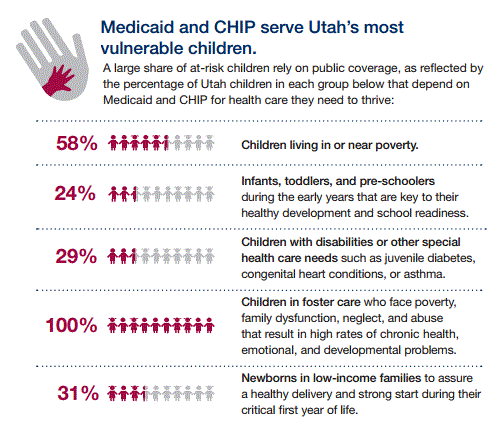
Now Congress is reversing this progress. The proposed repeal act threatens the health and well-being of Utah children and families.
By proposing to place a fixed cap allotment on the Medicaid program, the proposal places arbitrary, harmful limits on the amount of care a vulnerable child can receive. Caps inevitably lead to cuts in care. The children that will bear the burden of these cuts are our kids with special health care needs and chronic conditions: kids with cancer, asthma, or cystic fibrosis.
A Medicaid cap shifts costs to the state and creates more instability and volatility to a program that has worked for over 50 years.
In addition, while the proposal retains the provision in the ACA that allows children to stay on their parents’ health care to age 26, which we support, it phases out parallel language that allows children in foster care to retain their Medicaid coverage to age 26 through presumptive eligibility. Children aging out of foster care are some of our nation’s most at-risk kids. This proposal would leave vulnerable transition-age youth without coverage.
There are other dangerous provisions in the proposed bill, including cuts to Planned Parenthood and a rollback of essential health benefit protections. As more details emerge in the coming days, we will provide updates and analysis about the impact on kids and families.
But the bottom line is clear:
Congress’ repeal plan will hurt our most vulnerable children and families, drive up costs for families, and reverse the gains we have made for children’s health coverage and care.
Our families need a strong health care foundation now. Cuts to the Medicaid program will ripple throughout our health care system and hurt Utah families now and into the future.
For more information about how ACA repeal tax credits will affect families, see the Kaiser Family Foundation analysis.
Take Action!
 March 30, 2017 is Love UT Give UT!
March 30, 2017 is Love UT Give UT!
It’s a day for Utahns to give to the nonprofits that make Utah special. Every donation to Voices for Utah Children through Love UT Give UT gives Voices a chance to win matching grants and prizes—and gives you a chance to win a car!
And you don't have to wait! Donate now at http://bit.ly/loveUTchildren.
For 30 years now, Voices for Utah Children has called on our state, federal and local leaders to put children’s needs first. But the work is not done. The children of 30 years ago now have children of their own. Too many of these children are growing up in poverty, without access to healthcare or quality educational opportunities.
How can you be involved?
Make a tax-deductible donation to Voices for Utah Children—or join our Network with a monthly donation of $20 or more. Network membership includes complimentary admission to Network events with food, socializing, and opportunity to meet child advocacy experts. And don't forget to join our listserv to stay informed!
We look forward to the future of Voices for Utah Children and we hope you will be a part of our next 30 years.
Special thanks to American Express for sponsoring our 30th Anniversary Year. 
Utah needs earned-income tax credit to break poverty cycle
This op-ed by Matthew Weinstein of Voices for Utah Children and Derek Monson of the Sutherland Institute was originally printed in the Salt Lake Tribune on February 18, 2017.
For some children in Utah, poverty is their inheritance. By no choice of their own, they have never experienced life outside the world of welfare dependence.
As these children grow older, they face a daunting choice: continue in the lifestyle they know and grew up in, or transition toward an unfamiliar life of self-reliance. Even if these young people have a healthy desire for the latter, it can be a difficult road with many personal, cultural, educational, economic and policy barriers.
Fortunately, we can do something to tear down some of these barriers. Specifically, the Utah Legislature can start by passing HB294 — Utah Intergenerational Poverty Work and Self-Sufficiency Tax Credit.
This proposal would help those seeking a way out of intergenerational poverty by lowering tax barriers and allowing them to keep more of what they earn through employment. At the federal level, this policy is called the Earned Income Tax Credit (EITC). Creating an EITC for Utahns in intergenerational poverty makes sense on several levels.
Utah has been on the forefront of states seeking solutions for intergenerational poverty, and HB294 is a natural extension of those efforts. It provides a helping hand to those in intergenerational poverty when they reach the stage of being able and willing to achieve self-reliance through work.
Intergenerational poverty reflects at least a second generation of poverty, often with the higher level of discouragement and family dysfunction that commonly comes with that experience. It is deeper and tougher to climb out of than stereotypical poverty, which is usually due to a temporary setback like the loss of a job. Giving the full financial and human rewards of self-reliance through earned success to such families makes it more likely that their efforts to stay out of poverty will be successful.
Utah ranks No. 1 in the nation for social mobility. A child growing up in poverty in Utah has a better chance of making it into the middle class than in any other state. This is largely thanks to a culture that embraces two-parent families and a strong work ethic. Utah has the highest rate of two-parent families in the nation, translating into a relatively small share of children growing up in poverty. Utah also has labor force participation rates for both men and women that exceed the national average.
Utah also recently earned a No. 2 ranking in the nation for evidence-based policymaking, as determined by the Pew-MacArthur Results First Initiative. Few policies have as much evidence in support of their effectiveness as the EITC.
A Congressional Research Service report in 2014 found that the federal EITC lowered the proportion of American families in poverty between 14 and 30 percent, depending on marital status and family size. Currently its top advocate in Washington is House Speaker Paul Ryan, who has proposed expanding it further, saying, "This is one of the few programs that have shown results. It encourages people to work by increasing the rewards of work."
The EITC makes sense not only for those in poverty, but for the economy and taxpayers as well. For example, Glenn Hubbard, dean of Columbia Business School and chairman of the Council of Economic Advisers under President George W. Bush, has said, "[the] EITC truly is our best option for supporting work." Stanford University's Hoover Institution has concluded that "the EITC is probably the most cost-effective anti-poverty program the federal government operates."
HB294 would make Utah the 27th state in the nation to enact a state EITC. While this policy will not solve intergenerational poverty, it will add an effective tool to fighting poverty in Utah. It will also provide practical assistance to those seeking to overcome some of the greatest economic challenges that families in Utah face, and at a very reasonable cost.
Just as importantly, it shows that in our communities, we believe that a child's future inheritance should be more than their parents' poverty.
 March 30, 2017 is Love UT Give UT!
March 30, 2017 is Love UT Give UT!
It’s a day for Utahns to give to the nonprofits that make Utah special. Every donation to Voices for Utah Children through Love UT Give UT gives Voices a chance to win matching grants and prizes—and gives you a chance to win a car!
And you don't have to wait! Donate now at http://bit.ly/loveUTchildren.
For 30 years now, Voices for Utah Children has called on our state, federal and local leaders to put children’s needs first. But the work is not done. The children of 30 years ago now have children of their own. Too many of these children are growing up in poverty, without access to healthcare or quality educational opportunities.
How can you be involved?
Make a tax-deductible donation to Voices for Utah Children—or join our Network with a monthly donation of $20 or more. Network membership includes complimentary admission to Network events with food, socializing, and opportunity to meet child advocacy experts. And don't forget to join our listserv to stay informed!
We look forward to the future of Voices for Utah Children and we hope you will be a part of our next 30 years.
Special thanks to American Express for sponsoring our 30th Anniversary Year. 
The Utah Intergenerational Poverty Work and Self-sufficiency Tax Credit
Voices for Utah Children Supports HB 294, the Utah Intergenerational Poverty Work and Self-sufficiency Tax Credit. HB 294 strengthens Utah’s groundbreaking Intergenerational Poverty (IGP) initiative with an Earned Income Tax Credit (EITC). Twenty-six other states across the nation and across the political spectrum have already created state EITCs, boosting work, independence, and self-sufficiency for low-income families. Utah should too, starting with our most at-risk population, the 37,512 adults and 57,602 kids grappling with intergenerational poverty (comprising 25% of all adults receiving public assistance, 62% of whom worked in 2015).
How would the IGP EITC work? (HB 294)
It would create a state EITC for IGP families that work, qualify for the federal EITC, and file their state taxes
How much would families receive?
10% of the federal EITC: ~$250 on average, up to ~$600, depending on income and # of kids
For more information, see the complete factsheet:
![]() Vote Yes on HB 294: The IGP EITC
Vote Yes on HB 294: The IGP EITC
For 30 years now, Voices for Utah Children has called on our state, federal and local leaders to put children’s needs first. But the work is not done. The children of 30 years ago now have children of their own. Too many of these children are growing up in poverty, without access to healthcare or quality educational opportunities.
How can you be involved?
Make a tax-deductible donation to Voices for Utah Children—or join our Network with a monthly donation of $20 or more. Network membership includes complimentary admission to Network events with food, socializing, and opportunity to meet child advocacy experts. And don't forget to join our listserv to stay informed!
We look forward to the future of Voices for Utah Children and we hope you will be a part of our next 30 years.
Special thanks to American Express, our "Making a Difference All Year Long" sponsor. 
In Support of Medicaid Standards for Children
Why We Care About Medicaid “EPSDT” Benefits
and So Should You
While threats to the Affordable Care Act (ACA) may seem the most imminent in our current political landscape, Medicaid is also under attack. Congress and the new administration are discussing deep cuts and changes to the Medicaid program, through Medicaid block grants or per capita program caps. The new administration recently said they will be proposing block grants.
Medicaid block grants result in funding cuts and fewer people receiving coverage. Utah has long been recognized as a leader in health care innovation, but our ability to innovate will be severely impaired if we experience cuts to our foundational health care safety-net system through block grants. Medicaid is the cornerstone to children’s health coverage in Utah.
In a recent letter to Congress on January 13th, the Governor and state officials weighed in on a number of health reform proposals, including Medicaid. We saw many areas for concern in our state leaders’ letter; one brief recommendation in particular jumped out at us, because it would have significant and long-lasting consequences for children and families:
“Reevaluate the EPDST (Early Period Screening, Diagnosis and Treatment) benefit for children. EPDST requires states to provide comprehensive and preventative health services for Medicaid beneficiaries under the age of 21 with few limitations.
Consider limiting benefits to what is available in the private market. Currently, children on Medicaid have more access to services and benefits than children who are covered under good commercial plans.”
So, what is EPSDT?
Early, Periodic Screenings, Diagnosis & Treatment
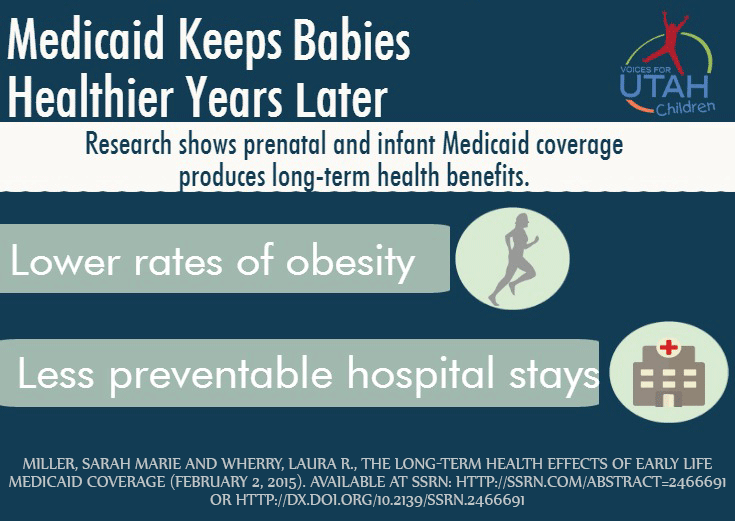 The EPSDT benefit, known in Utah as “CHEC” or Children’s Health Evaluation and Care, is one of the hallmarks of the Medicaid program. The Medicaid Act currently requires states to provide children with a comprehensive scope of services. For decades, EPSDT has allowed providers to catch potential health problems early, when they are easiest to treat and children stand the best chance of developing to their fullest potential. Covered EPSDT services include basic preventative care, such as dental and vision services, plus services needed to address acute, long-term, and disabling conditions, such as physical, speech and behavioral health therapies and in-home nursing. The EPSDT benefit is considered the gold standard for children’s pediatric benefits. It helps doctors determine the best level of care for their patient.
The EPSDT benefit, known in Utah as “CHEC” or Children’s Health Evaluation and Care, is one of the hallmarks of the Medicaid program. The Medicaid Act currently requires states to provide children with a comprehensive scope of services. For decades, EPSDT has allowed providers to catch potential health problems early, when they are easiest to treat and children stand the best chance of developing to their fullest potential. Covered EPSDT services include basic preventative care, such as dental and vision services, plus services needed to address acute, long-term, and disabling conditions, such as physical, speech and behavioral health therapies and in-home nursing. The EPSDT benefit is considered the gold standard for children’s pediatric benefits. It helps doctors determine the best level of care for their patient.
EPSDT has helped millions of children, especially children with special health care needs, receive the level of the care they need. In fact, many families in the private insurance market will turn to Medicaid coverage for their children with special health care needs-- because they cannot afford such comprehensive benefits in their “good” commercial plan.
We Need to Protect EPSDT
Medicaid is the cornerstone for children’s health coverage in our state, and serves over 20% of our most vulnerable families. If we roll-back the EPSDT benefit, we will see a surge of parents no longer able to afford care, particularly for children with special health care needs.
EPSDT protects families; it assures families that they can receive a minimum level of coverage and have access to services that meet prevailing standards of care. For many higher-income families, Medicaid may seem unconnected to their day-to-day lives. But one of the core tenets of our health care safety-net is that it is there for families when they need it.
There are many improvements needed to our Medicaid program. But the EPSDT benefit package is not one of them. So why fix what isn’t broken? Instead, for example, Medicaid mental and behavioral health services should be better integrated and aligned with physical health benefits.
Instead of trying to raise health care standards for all kids, our state and federal leaders are instead looking to dilute standards. It is perverse logic to limit progress and roll-back gains, in order to achieve equality. Instead we should advance the progress made so all children can achieve affordable, comprehensive coverage.
We urge our state and federal leaders:
Do not limit benefits for children and weaken our existing standards.
Build on the progress we have made.
Strengthen coverage and care for all Utah children.
For 30 years now, Voices for Utah Children has called on our state, federal and local leaders to put children’s needs first. But the work is not done. The children of 30 years ago now have children of their own. Too many of these children are growing up in poverty, without access to healthcare or quality educational opportunities.
How can you be involved?
Make a tax-deductible donation to Voices for Utah Children—or join our Network with a monthly donation of $20 or more. Network membership includes complimentary admission to Network events with food, socializing, and opportunity to meet child advocacy experts. And don't forget to join our listserv to stay informed!
We look forward to the future of Voices for Utah Children and we hope you will be a part of our next 30 years.
Special thanks to American Express, our "Making a Difference All Year Long" sponsor. 
Changes to Medicaid’s financing structure through a block grant or per capita cap would create large shortfalls in state funding. These would inevitably lead to limits placed on the program, such as a reduction in benefits or fewer children covered. The impact of these cuts would be even greater when utilization or enrollment goes up. For example, Utah would not be able to keep up with Medicaid demand during a recession, when many more children become newly eligible for and enroll in Medicaid. During the last recession, Medicaid added 30,000 enrollees in one year, a growth rate significantly higher than previous years. Under a block grant or per capita cap structure, the state would not be able to meet this sudden demand.
The charts below illustrate the Utah budget impact of the most recent House of Representatives block granting or per capita cap scenario if it had gone into effect a decade ago. The scenario is based on House Speaker Ryan’s federal budget proposal for FY2017. Under the proposal, Utah could expect to see a 25% cut to its federal Medicaid funding by the end of the first decade, because the proposal limited increases in federal Medicaid funding to the general consumer inflation rate rather than the medical cost inflation rate, which is higher (even for Medicaid, which has a lower inflation rate than private insurance). Thus, the scenarios below show federal Medicaid funding to Utah increasing annually by about 2% rather than the actual average increase of over 5%.
Since the Ryan proposal did not specify a state match or Maintenance of Effort (MOE) requirement, we present a worst-case scenario where Utah’s state Medicaid contribution remains flat at the FY2007 level and a best-case scenario where Utah’s state Medicaid contribution increases by 60% over the last decade (as it actually did in nominal terms, not adjusted for inflation).*
*Based on information available from Utah Medicaid Annual Reports. For additional information on Speaker Ryan’s proposals see the Congressional Budget Office report, “The Long-Term Budgetary Impact of Paths for Federal Revenues and Spending Specified by Chairman Ryan,” March 2012, .
For 30 years now, Voices for Utah Children has called on our state, federal and local leaders to put children’s needs first. But the work is not done. The children of 30 years ago now have children of their own. Too many of these children are growing up in poverty, without access to healthcare or quality educational opportunities.
How can you be involved?
Make a tax-deductible donation to Voices for Utah Children—or join our Network with a monthly donation of $20 or more. Network membership includes complimentary admission to Network events with food, socializing, and opportunity to meet child advocacy experts. And don't forget to join our listserv to stay informed!
We look forward to the future of Voices for Utah Children and we hope you will be a part of our next 30 years.
Special thanks to American Express, our "Making a Difference All Year Long" sponsor. 
New Utah-specific report on ACA repeal details impact to Utah families
Salt Lake City—The number of uninsured Utah children would more than double if Congress repeals the Affordable Care Act (ACA) without a comprehensive replacement plan, according to new data released by the Urban Institute. The new data offer more detail than we’ve ever seen before about how repeal without a replacement will affect Utah children and families. As Congress and the new administration begin the process of repealing the ACA, they have yet to negotiate an agreement on a replacement and may delay doing so indefinitely.
Repealing the ACA without a replacement in place will leave even more Utah children uninsured than before the ACA came into being. While most attention has been directed toward the fact that ACA repeal could end the ACA health insurance marketplace—in itself devastating for Utah families because Utah has one of the highest marketplace enrollment rates in the nation—the ACA repeal will also affect CHIP and Medicaid, tearing away at key features of Utah’s safety net that existed long before the ACA.
All Utah families stand to lose a number of health insurance protections, not only families enrolled in the marketplace. In a letter to Congress dated January 13th, Governor Herbert and state officials expressed interest in rolling back ACA protections from insurance discrimination based on gender. In the same letter, they also supported a return to exclusions for those with pre-existing conditions. The roll-back of these ACA protections would lead to an increased medical burden for many Utah families.
The report by the Urban Institute estimated that by 2019, Utahns would see the following consequences of ACA repeal:
- 273,000 more Utahns would become uninsured, raising Utah’s total uninsured rate from 12% to 21%.
- 73,000 Utah children would become newly uninsured, resulting in 141,000 children without insurance. Of the Utah children who stand to lose insurance, 88% have at least one full-time working parent in the home.
- 89,000 additional Utah parents would become uninsured, putting increased economic stress on the entire family.
“Thanks to the ACA, CHIP and Medicaid, more Utah children are insured than ever before,” said Jessie Mandle, Senior Health Policy Analyst at Voices for Utah Children. “We need a plan to build on these gains, instead of going backward.”
Read the Utah fact sheet here:
Partial Repeal of the ACA through Reconciliation: Coverage Implications for Utah Residents
The new Utah factsheet is based on research compiled by the Urban Institute in December, which was modeled on a Congressional repeal bill from 2016 similar to present Congressional proposals.
Partial Repeal of the ACA through Reconciliation: Coverage Implications for Parents and Children
Image Credit: Monkey Business Images | Dreamstime.com - Mother Taking Temperature Of Sick Daughter
For 30 years now, Voices for Utah Children has called on our state, federal and local leaders to put children’s needs first. But the work is not done. The children of 30 years ago now have children of their own. Too many of these children are growing up in poverty, without access to healthcare or quality educational opportunities.
How can you be involved?
Make a tax-deductible donation to Voices for Utah Children—or join our Network with a monthly donation of $20 or more. Network membership includes complimentary admission to Network events with food, socializing, and opportunity to meet child advocacy experts. And don't forget to join our listserv to stay informed!
We look forward to the future of Voices for Utah Children and we hope you will be a part of our next 30 years.
Special thanks to American Express, our "Making a Difference All Year Long" sponsor. 

